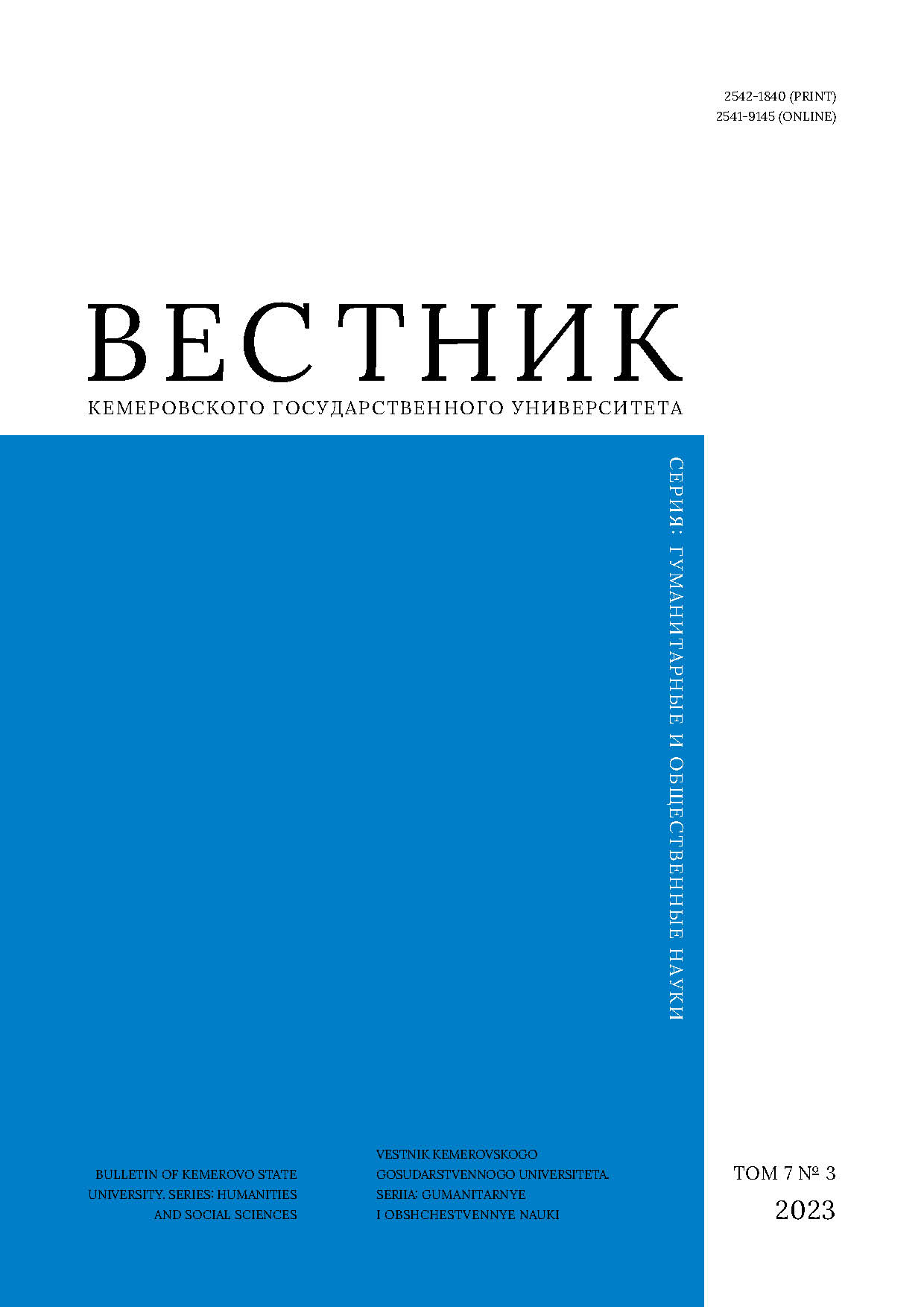Secondary School No. 80
Kemerovo, Russian Federation
Kemerovo, Russian Federation
The research featured the development of cognitive gender-related functions in teenagers. It covered statistically significant differences in such indicators as establishing analogies, visual memory volume, and attention span. The indicators of mental operations and memory volume proved to be interconnected, as well as the indicators of mental operations and attention properties. The male group demonstrated direct connections between visual memory volume and the abilities to compare and contrast abstract notions and continue numerical series. Auditory short-term memory volume depended on the ability to perform arithmetic tasks and numerical series. Auditory long-term memory volume also depended on the numerical series performance. Another interconnection was registered between the indicators of auditory memory volume, arithmetic tasks, comparing and contrasting abstract ideas, and numerical series. The test also revealed correlations between the indicators of selective attention and the ability to follow instructions, as well as to compare and contrast abstract notions. In the female group, visual memory volume, auditory long-term memory volume, and auditory-mediated memory volume were connected with the abilities to complete sentences, determine abstract similarities and differences, establish analogies, identify symbols, and follow instructions. Obviously, when working with young teenagers, changes in intellectual development should be forecasted based on memory volume indicators. The study revealed direct connections between indicators of attention properties, i.e., span, distribution, and selectivity, and all indicators of mental development, excluding the ability to interpret symbols. The end-to-end cognitive processes made it possible to predict the cognitive development in young adolescents, based on their individual cognitive profiles.
thinking, attention, memory, mental operations, young adolescence
1. Romanov K. M. Informative processes in the structure of the dualogue. Gumanitarian: aktual'nye problemy gumanitarnoi nauki i obrazovaniia, 2010, (1): 78-86. (In Russ.) https://elibrary.ru/msuipb
2. Kharkova D. Yu., Safargalina E. I. Bases of the theory of cognitive development of Piaget. Colloquium-journal, 2019, (26-2): 53-55. (In Russ.) https://doi.org/10.24411/2520-6990-2019-10938
3. Oleinikova A. M. Characteristics of the psychologic-pedagogical process in the works of Alfred Binet. Severo-Kavkazskii psikhologicheskii vestnik, 2010, 8(3): 5-7. (In Russ.) https://elibrary.ru/rbvwsf
4. Kulikov D. K. L. S. Vygotsky, A. N. Leontiev, and E. V. Ilyenkov: identifying activity nature of thinking. Economic and Social Research, 2018, (3): 71-84. (In Russ.) https://doi.org/10.24151/2409-1073-2018-3-71-84
5. Tagirova R. A., Shimaeva L. R. Vygotsky's theory of cognitive development. Dostizheniia nauki i obrazovaniia, 2023, (1): 44-46. (In Russ.) https://doi.org/10.24411/2413-2071-2023-10104
6. Luria A. R. Memory. Lectures on general psychology. St. Petersburg: Piter, 2018, 234-284. (In Russ.)
7. Rubinstein S. L. Attention. Fundamentals of general psychology. Moscow: AST, 2020, 615-636. (In Russ.)
8. Khomskaya E. D. Neuropsychology. 4th ed. St. Petersburg: Piter, 2014, 496. (In Russ.)
9. Blauberg I. Bergson. Filosofskaya antropologiya, 2019, 5(2): 118-135. (In Russ.) https://doi.org/10.21146/2414-3715-2019-5-2-118-135
10. Gurova S. I. Philosophical anthropology of P. P. Blonsky. Vestnik of MSTU, 2008, (4): 595-601. (In Russ.) https://elibrary.ru/jwltpn
11. Koposova T. S., Kazakova E. V. Cognitive development seventy- - eleven year schoolchildren polar regions. Pedagogicheskij zhurnal Bashkortostana, 2015, (6): 42-48. (In Russ.) https://elibrary.ru/vmgdwf
12. Medvedeva I. A., Pamfilova S. A. Study of the interrelation of teenagers' cognitive style and their personality characteristics. Fundamentalnye aspekty psikhicheskogo zdorovia, 2018, (3): 37-39. (In Russ.) https://elibrary.ru/vlywxi
13. Khominskaya V. V. Cultural and historical theory of L. S. Vygotsky as philosophical methodology of modern education. Kontekst i refleksiya: filosofiya o mire i cheloveke, 2016, (3): 32-41. (In Russ.) https://elibrary.ru/wtifgj
14. Poshekhonova V. A. Functional signs of competent activity of the psychologist. Humanities, social-economic and social sciences, 2013, (2): 285-288. (In Russ.) https://www.elibrary.ru/pzeogp
15. Zeer E. F., Pavlova A. M. Applied aspects of A. N. Leontiev's general psychological theory of activity: dedicated to the 100th anniversary of A. N. Leontiev. Obrazovanie i nauka. Izvestiia UrO RAO, 2003, (1): 92-104. (In Russ.) https://www.elibrary.ru/pjgikl
16. Zhigadlova I. V. Organizing game activities with preschoolers: Federal State Education Standard. Concept, 2016, 46: 133-135. (In Russ.) https://www.elibrary.ru/xbpafp
17. Shereshevsky G. The comparative analysis of the concepts of development in works of Vygotsky and Piaget: a neuropsychological approach. Sibirskiy Psikhologicheskiy Zhurnal, 2006, (24): 77-86. (In Russ.) https://www.elibrary.ru/knvdjd
18. Sorokoumova E. A., Popova V. K. Development of cognitive sphere of modern younger schoolboys in educational activity. Kollekciya gumanitarnyh issledovanij, 2019, (2): 6-10. (In Russ.) https://www.elibrary.ru/wazpsr
19. Muzhichenko M. V. Studying the higher nervous activity state of schoolchildren in puberty. Vestnik Volgogradskogo gosudarstvennogo universiteta. Seriia 7: Filosofiia. Sotsiologiia i sotsialnye tekhnologii, 2008, (2): 157-162. (In Russ.) https://www.elibrary.ru/kudwsb
20. Popova E. V., Volokitina T. V. Features of intellect structure development in schoolchildren aged 11-18 years. Vestnik Severnogo (Arkticheskogo) federalnogo universiteta. Seriia: Estestvennye nauki, 2012, (1): 77-86. (In Russ.) https://elibrary.ru/pfrzon
21. Romanova M. A. Traditional approaches to cognitive development. Siberian Pedagogical Journal, 2008, (4): 306-311. (In Russ.) https://www.elibrary.ru/pfspkv
22. Falikman M. Cognitive science: its foundations and challenges. Logos, 2014, (1): 1-18. (In Russ.) https://www.elibrary.ru/qezzjc
23. Pavlovskaya N. G., Baykadamov D. V. Features of logical thinking of modern teenagers. Pedagogical perspective, 2021, (2): 30-35. (In Russ.) https://doi.org/10.55523/27822559_2021_2_30
24. Katerinina A. A. Memory intellectualization as one of mechanisms of development of consciousness of children in teenage crisis. Sovremennye issledovaniia sotsialnykh problem (elektronnyi nauchnyi zhurnal), 2012, (9): 64-72. (In Russ.) https://www.elibrary.ru/pflqit
25. Tsigichko E. A., Krivoruchko M. O. Attention span in preteen boys and girls. Vestnik Kemerovskogo gosudarstvennogo universiteta. Seriia: Gumanitarnye i obshchestvennye nauki, 2023, 7(1): 8-13. (In Russ.) https://doi.org/10.21603/2542-1840-2023-7-1-8-13


















